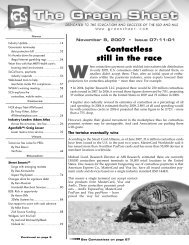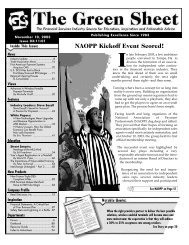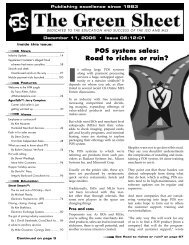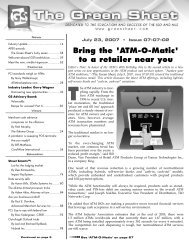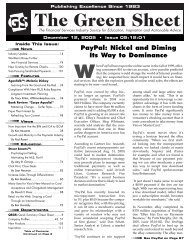Checks ? Here Today, Here Tomorrow Visa and ... - The Green Sheet
Checks ? Here Today, Here Tomorrow Visa and ... - The Green Sheet
Checks ? Here Today, Here Tomorrow Visa and ... - The Green Sheet
You also want an ePaper? Increase the reach of your titles
YUMPU automatically turns print PDFs into web optimized ePapers that Google loves.
Page 9<br />
Transforming Paper <strong>Checks</strong> into<br />
Electronic Transactions<br />
<strong>The</strong> Role of the Western Payments<br />
Alliance in a Digital World<br />
By Gerard F. Milano, CEO,<br />
Western Payments Alliance<br />
Over the next few years, the automated clearinghouse<br />
(ACH) network is poised to prove a<br />
whole generation of prognosticators right as<br />
new payment options begin to eliminate a significant<br />
volume of paper checks.<br />
<strong>The</strong> reason: Innovations such as RCK, point-of-sale technology<br />
<strong>and</strong> lockbox truncation – as well as customer-initiated<br />
transactions over the Internet <strong>and</strong> via wireless – are<br />
showing strong adoption rates after a long gestation period.<br />
<strong>The</strong>se new systems are critical to the future of the<br />
global economy <strong>and</strong> will play an important role in reducing<br />
the more than 70 billion checks written annually in the<br />
United States.<br />
Not only will these innovations significantly decrease<br />
costs, reduce fraud <strong>and</strong> improve risk <strong>and</strong> cash management,<br />
they also presage a new future of opportunity for<br />
developing payments systems. As electronic files come to<br />
replace paper checks, the rate of change within the payments<br />
system will accelerate to keep pace with a method<br />
of payment moving at the speed of light.<br />
Unlike the past, these new systems are gaining traction<br />
today because they are succeeding in turning paper checks<br />
into digital files as close to the source <strong>and</strong> as quickly as<br />
possible. Western Payments Alliance members are actively<br />
implementing the infrastructure to eliminate checks<br />
before they are written or to shorten their expensive journey<br />
through the clearing <strong>and</strong> settlement process.<br />
All of this is made possible by a powerful <strong>and</strong> propitious<br />
combination of new technology, evolving federal legislation,<br />
the consolidation of the financial services industry,<br />
new industry st<strong>and</strong>ards <strong>and</strong> changes in consumer behavior.<br />
As important as these developments are, they also introduce<br />
an enormous amount of complexity into the payments<br />
system that early electronic payments were able to<br />
avoid. Direct deposit <strong>and</strong> automatic bill payment – the<br />
phenomenally successful ACH innovations that have laid<br />
the groundwork for this generation of payments options –<br />
are, in a sense, the lowest hanging fruit. <strong>The</strong>y are among<br />
the least complicated ACH transactions because they<br />
involve the fewest variables.<br />
<strong>The</strong> error rate on a direct deposit or automatic bill payment,<br />
once it has been set up, is extremely low because the<br />
payment flows down the same controlled path each time;<br />
the payments aren’t dynamic by nature. In the event a<br />
problem does arise, Western Payments Alliance members<br />
have been able to resolve most problems without issue,<br />
<strong>and</strong> WesPay’s customer service center has been available<br />
for the oddball exceptions.<br />
With RCK, lockbox truncation <strong>and</strong> point-of-sale technology,<br />
complexity increases geometrically. <strong>The</strong>se ACH transactions<br />
are not really batch processing items but frequently<br />
are unique transactions that require greater technologic<br />
<strong>and</strong> supervisory sophistication from the beginning of the<br />
transaction to the end. As these systems begin pouring billions<br />
of new electronic transactions into the ACH network,<br />
the error rate will be higher than the relatively low exception<br />
rate of paper checks.<br />
As this occurs, what recourse will consumers, merchants<br />
<strong>and</strong> financial institutions have when electronic transactions<br />
are debited or credited to the wrong account? How<br />
does someone get hold of an electronic check inside the<br />
ACH network? What rules will govern these transactions?<br />
How will competing financial institutions interact cooperatively<br />
<strong>and</strong> efficiently in a world where ACH is increasingly<br />
the currency of choice?<br />
Role of the Western Payments Alliance<br />
As ACH transaction volume grows, the Western Payments<br />
Alliance takes on a new, more strategic role. One key<br />
objective in this new era is to serve as the bridge between<br />
the disparate processing platforms within financial institutions<br />
responsible for h<strong>and</strong>ling checks <strong>and</strong> electronic payments.<br />
<strong>Today</strong>, those organizations exist largely as independent<br />
silos, particularly at the largest depository institutions.<br />
To help financial institutions succeed in the new payments<br />
l<strong>and</strong>scape, WesPay is committed to the following strategic<br />
objectives:



